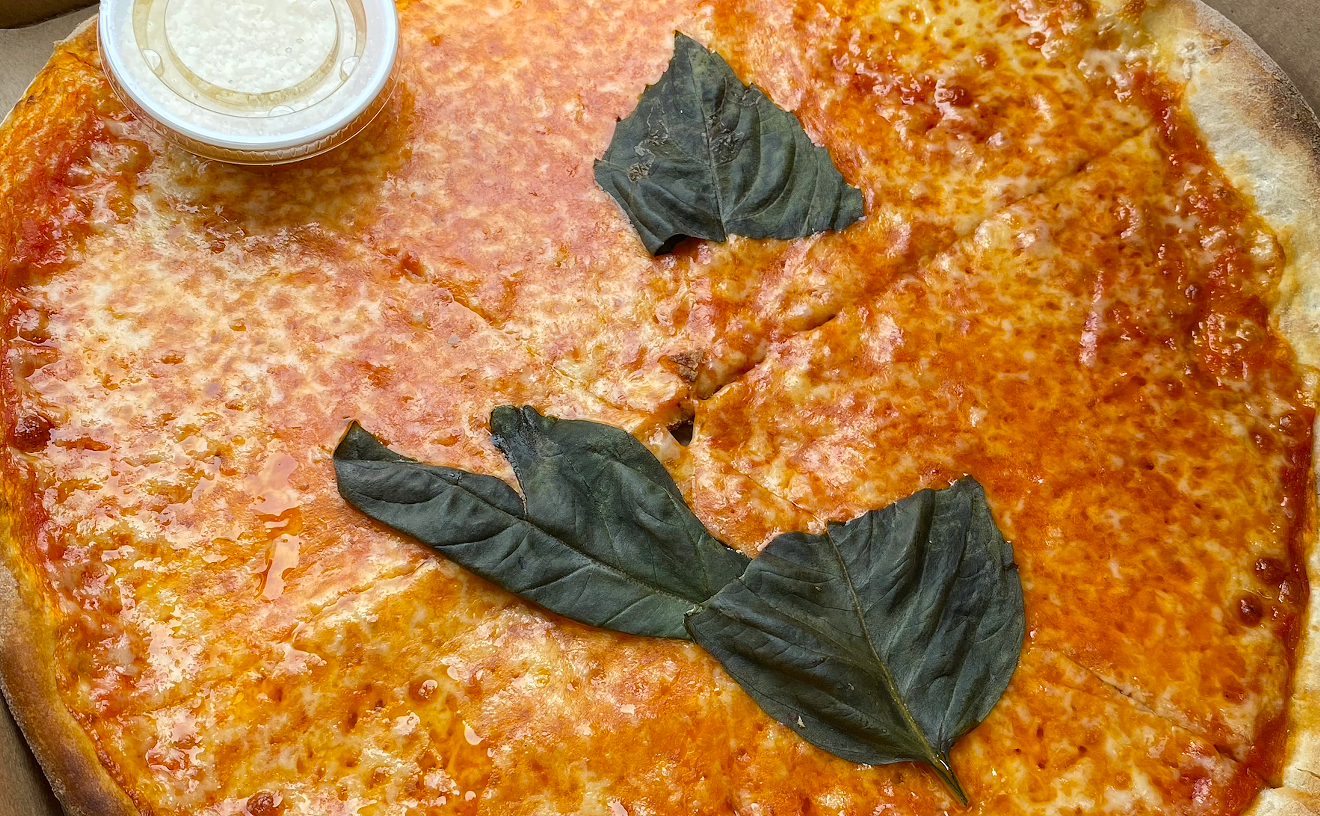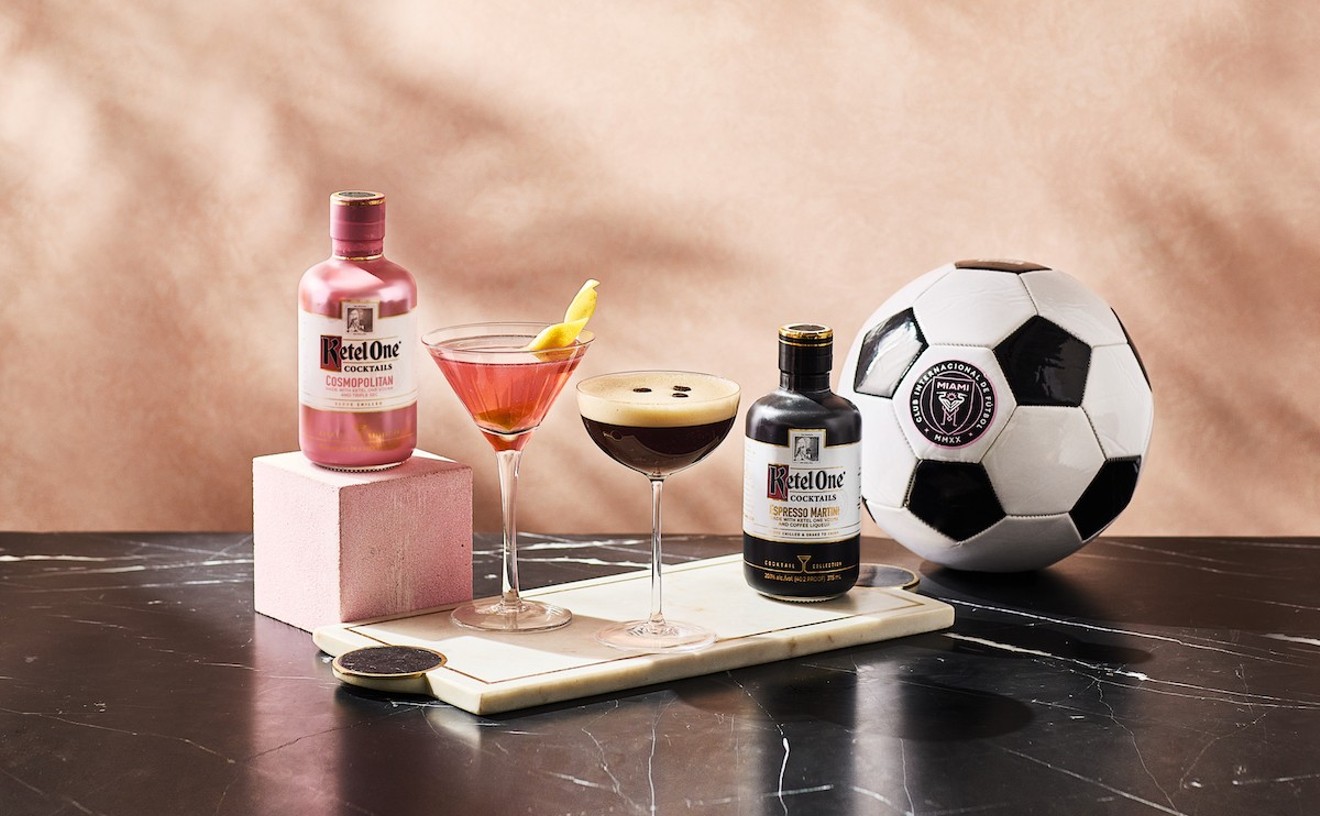In the dining room of Dapur on a square white plate, a seafood tower leans like Pisa. A crispy homemade rice cake serves as the base, with separate layers of neon avocado, sweet lump crab, and spicy tuna. It's topped with a tendril of green melon skin that cascades down the sides. Flavors are less distinct than the levels: undersalted and muted, except for the bite in an angry pink layer that's macerated into form. The $14 plate called "hot tower" is served room temperature yet illuminates the dining room's emphasis on pretty.
It isn't just the food on the plate that's sculpted. It's the calves of the women servers who click through the dining room on heels during service. For a shoe fetishist, the female staff is a bounty of stilettos, pumps, wedges, and kitten heels. "Would you like another glass of Prosecco?" a dark- haired pixie server asks me. Her dress, a Shantung green sheath matching the wall's color, looks like cocktail attire.
Dapur opened on North Federal in Fort Lauderdale this past July, a creation of Edi Mulyanto, a former general manager of Galanga, a Wilton Manors mainstay celebrated for its scene over cuisine. At Galanga, carved wooden screens and a giant saltwater fish tank anchor the eye in a restaurant that's attentive to design details.
Such is the case at Dapur, where even the entrance offers visual stimuli. Retro-chrome bar tables frame one side of the door, a fountain and greenery on the other, and papery chandeliers light the mood — all this before a customer even walks inside. At the bar off to the left, speakers that would dwarf a child pump beats so loud that you feel it in your chest. To the right in the dining room, a giant golden Buddha meditates against the wall, while another lounges in a painting framed in purple. Gossamer room dividers flutter in a fan-induced breeze. Orchids pose in bursts of magenta.
"We're really sorry we don't have a sushi bar," says a host who's dressed like a geisha. "You'll have to sit at the table alone."
Sushi is not available at the bar, only hot dishes and savories, despite that there's no differentiation in the menu between rooms. The host sat me next to his stand, "so we can keep you company," he said, and he did.
He delivered the $12 royal tuna roll, the most popular sushi item. Striped in layers of pink tuna and white wahoo, it would make a girly-girl squeal. A white jalepeño aioli painted the plate in dots and dashes. As pretty as it was, Dapur apparently has not gotten the memo: Tuna's overfished. The result means so-so fish that's been gassed to keep up appearances. Despite the pretty presentation, the roll is forgettable.
Tables showcasing purple napkins and plenty of elbow room are spaced far enough apart that conversation between them is nonexistent, yet the echo from the bare space has an underwater effect. At one table, a family of three gets comfortable: a blond mother in a French bateau shirt, her husband in black Costello specks, and an 8-year-old boy in green Crocs playing drums with his chopsticks. Nearby, it's date night: A manicured woman in towering heels and a navy chiffon sparkly dress pulls her chair closer to her hunky, dressed-down date. Closer to the entrance, three guys with long wavy hair and in buttoned-downs and pegged pants peruse a cocktail menu that offers dozens of options.
This cocktail menu is among the more ambitious of any offered in South Florida right now, with one page of $10 classics such as a negroni and an old-fashioned and another a list of newfangled drinks such as the Dartmoor, with cucumber and lemon, Plymouth gin, and St. Germain. I ordered a negroni from the bartender after 10, in between dinner and clubbing hour.
"What's in it again?" asked the bartender, who is more used to making sweet sips than bitter apéritifs. It arrives looking like no negroni should, rather like a sherbet Push-Up ice cream treat: the top layer white, the lower half orange. This wasn't the only cocktail bartenders were botching. A drinks 101 lesson for the staff may be in order for such a list.
The bar would seem the place to chat with fellow diners and drinkers, yet the acoustics prevent it, steering the night's adventure from the company to the savory offerings. And it's here where appearances unravel. A $6 oxtail soup is served in a shallow trough, three bones with bright-red meat still adherent, in a lemongrass broth that's hardly skimmed. The soup is inedible. I should have sent it back.
A dish that's usually a crowd pleaser, the $12 miso cod arrives as three medallions alone on a plate. Laden with bones, the fish is shriveled and dry. The $9 hamachi kama is similarly disconcerting. Masquerading as a triangle-shaped pastry framed by a jawbone and a stray fin, it's overcooked. Fish flakes like old paper, devoid of succulence.
The $10 pecel is a disaster. "We've never served this," said the bartender upon order. And for good reason. A bowl of waffled vegetables is dolloped with peanut sauce, walled with boxy tofu, layered with stale tongues of shrimp crackers, and garnished with a trio of hard-boiled quail eggs. It's a shame of a plate.
Still hungry as I snacked on stale shrimp chips, I realize Dapur is the kind of restaurant for people in search of escape: a hotter partner, a bigger bank account, a more interesting job, a more happening city. The experience is delivered as a spa for the senses and a pampering staff. It's when the food is served that the illusion breaks, where pretty plates dubbed "Asian fusion" fail to deliver something of substance.
As the music pumps, the breeze tends to gossamer like models on a shoot. I pick around a plate, looking up to a man in the corner in a European-cut suit. He mouths something across the room. I can't hear. Instead, he shrugs and winks: a sentiment best embraced by customers at Dapur hoping for an experience that's as pleasing to the palate as it is to the eye.










